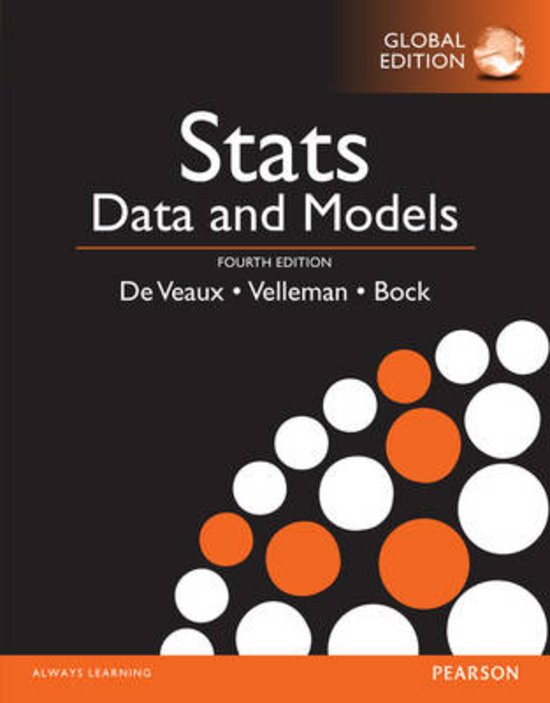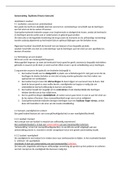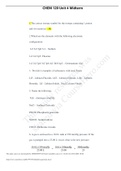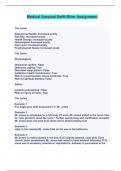INFERENTIAL STATISTICS
LECTURE 1
Notation for statistics and parameters
Point estimate: best estimate/guess for a unknown population
parameter.
- Sample mean = point estimate of population mean.
Evidence estimate: estimate based on evidence.
Population parameter unknown à use statistics sample data (p
hat) to estimate p.
Measurement level
Categorical à counts / proportions
Quantitative à means
Proportions (sample proportions)
à In binominal setting/dichotomous variable/yes-no situation from SRS
SDM: N(μp, σp)
- Normal distributed if n is big enough.
- The normal approximation for the binomial
problem.
- Binominal probability model: B(n,p).
Assumptions & conditions for using SDM
- Independence assumption: sampled values must be independent of each other.
- 10% condition: sample must be less than 10% of the population.
- Randomization condition: subjects were randomly assigned.
- Succes/failure condition: np > 10 + n(1-p) > 10
o Sample size * proportion.
Standard error: standard deviation of sampling distribution (via the sample).
CI for proportions: estimate ± ME (Margin of Error)
- More confidence = less informative/precise à larger Margin of Error
- We are 95% confident that the interval contains the true proportion.
, LECTURE 2
Steps
1. Formulate HO and HA
2. Define alpha level (0.05)
3. Give test statistic (formula) plus distribution (N (0,1)).
4. Investigate assumptions
5. Calculate test-statistic + carry out test (P-value/critical value).
Z-test for one proportion
- Short report: z-test for one proportion: [answer], n = …, p ….
- With N(0,1) distribution
Null hypotheses:
- There is no difference/is the same as...
- Nothing changed
Alternative hypotheses:
- The percentage is higher than…
- Two tailed: not equal too.
P-value method
If the P-value is smaller than alpha level, than the data are significant à we have enough evidence to
reject HO.
- If the P-valueof the test is greater than a alpha level, we accept the null hypothesis ( ... the
outcome of the sample is not extreme different from the null hypothesis).
- If the P-value is less than that criterium we should reject the null hypothesis, and ccept the
alternative as a plausible outcome. (... the outcome of the sample is extreme, the null
hypothesis can’t be true)
- Low value (below alpha level): reject HO.
- High value (above alpha level): no reason to reject HO.
- Two tailed: P-value= 2(0,1335)= 0,267 (26,7%).
- Right-sided test: P-value = 1-0,7642 = 0,236.
- Notation: P (Z > [ outcome test]) = [outcome Table A] / P (Z < [ outcome test]) = [outcome
Table A]
Critical value method
If the test statistic is bigger than the critical value, then the data are significant à enough evidence
to reject HO.
- Negative Z-value for right sided test: never reject.
- Notation: if z > z* then reject HO
LECTURE 1
Notation for statistics and parameters
Point estimate: best estimate/guess for a unknown population
parameter.
- Sample mean = point estimate of population mean.
Evidence estimate: estimate based on evidence.
Population parameter unknown à use statistics sample data (p
hat) to estimate p.
Measurement level
Categorical à counts / proportions
Quantitative à means
Proportions (sample proportions)
à In binominal setting/dichotomous variable/yes-no situation from SRS
SDM: N(μp, σp)
- Normal distributed if n is big enough.
- The normal approximation for the binomial
problem.
- Binominal probability model: B(n,p).
Assumptions & conditions for using SDM
- Independence assumption: sampled values must be independent of each other.
- 10% condition: sample must be less than 10% of the population.
- Randomization condition: subjects were randomly assigned.
- Succes/failure condition: np > 10 + n(1-p) > 10
o Sample size * proportion.
Standard error: standard deviation of sampling distribution (via the sample).
CI for proportions: estimate ± ME (Margin of Error)
- More confidence = less informative/precise à larger Margin of Error
- We are 95% confident that the interval contains the true proportion.
, LECTURE 2
Steps
1. Formulate HO and HA
2. Define alpha level (0.05)
3. Give test statistic (formula) plus distribution (N (0,1)).
4. Investigate assumptions
5. Calculate test-statistic + carry out test (P-value/critical value).
Z-test for one proportion
- Short report: z-test for one proportion: [answer], n = …, p ….
- With N(0,1) distribution
Null hypotheses:
- There is no difference/is the same as...
- Nothing changed
Alternative hypotheses:
- The percentage is higher than…
- Two tailed: not equal too.
P-value method
If the P-value is smaller than alpha level, than the data are significant à we have enough evidence to
reject HO.
- If the P-valueof the test is greater than a alpha level, we accept the null hypothesis ( ... the
outcome of the sample is not extreme different from the null hypothesis).
- If the P-value is less than that criterium we should reject the null hypothesis, and ccept the
alternative as a plausible outcome. (... the outcome of the sample is extreme, the null
hypothesis can’t be true)
- Low value (below alpha level): reject HO.
- High value (above alpha level): no reason to reject HO.
- Two tailed: P-value= 2(0,1335)= 0,267 (26,7%).
- Right-sided test: P-value = 1-0,7642 = 0,236.
- Notation: P (Z > [ outcome test]) = [outcome Table A] / P (Z < [ outcome test]) = [outcome
Table A]
Critical value method
If the test statistic is bigger than the critical value, then the data are significant à enough evidence
to reject HO.
- Negative Z-value for right sided test: never reject.
- Notation: if z > z* then reject HO





